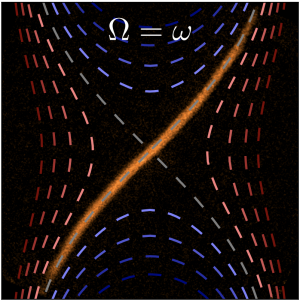Richard J. Fletcher, Airlia Shaffer, Cedric C. Wilson, Parth B. Patel, Zhenjie Yan, Valentin Crépel, Biswaroop Mukherjee, Martin W. Zwierlein
Science 18 Jun 2021:
Vol. 372, Issue 6548, pp. 1318-1322
The physics of rotation plays a fundamental role across all physical arenas, from nuclear matter, to weather patterns, star formation, and black holes. The behaviour of neutral objects in a rotating frame is equivalent to that of charged particles in a magnetic field, which exhibit intriguing transport phenomena such as the integer and fractional quantum Hall effects. An intrinsic feature of both these systems is that translations along different directions do not commute, implying a Heisenberg uncertainty relation between spatial coordinates. This underlying non-commutative geometry plays a crucial role in quantum Hall systems, but its effect on the dynamics of individual wavefunctions has not been observed. Here, we exploit the ability to squeeze non-commuting variables to dynamically create a Bose-Einstein condensate in the lowest Landau level (LLL). We directly resolve the extent of the zero-point cyclotron orbits, and demonstrate geometric squeezing of the orbits’ guiding centres by more than 7 dB below the standard quantum limit. The condensate attains an aspect ratio exceeding 100 and an angular momentum of more than 1000ℏ per particle. This protocol naturally prepares a condensate in which all atoms occupy a single Landau gauge wavefunction in the LLL, with an interparticle distance approaching the size of the cyclotron orbits, offering a new route towards strongly correlated fluids and bosonic quantum Hall states.
